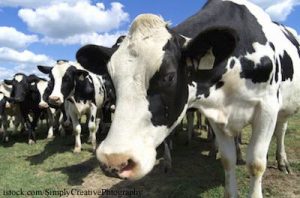At least one case of bovine spongiform encephalopathy (BSE), otherwise known as Mad Cow Disease, has been confirmed in Germany. That country has claimed for years that its country was free of BSE, but they were wrong. Public health officials claim that the cow was killed and none of it entered the food chain.
 Germany instituted “high standards” for animal feed, but traces of meat and bone meal were found in cattle feed recently. A 1994 European Union ban on feeding ruminants meat by-products was supposed to eliminate those ingredients.
Germany instituted “high standards” for animal feed, but traces of meat and bone meal were found in cattle feed recently. A 1994 European Union ban on feeding ruminants meat by-products was supposed to eliminate those ingredients.
The cow was 10 years old, and tested positive for atypical BSE, which develops spontaneously in older cows. It had seven offspring. Five have already been slaughtered, and two others were on the same farm. They have been tested and killed. The herd is currently under quarantine, awaiting further testing.
A crisis team is now going to test all cattle over the age of 30 months for the disease. Currently, all cows over the age of eight years are automatically tested for BSE. In the 1990s, there was a BSE epidemic in the UK, with almost 1,000 cattle cases diagnosed every week. France had 90 cases of BSE in cows last year, compared to 31 in 2012.
The progressive neurological disorder is caused by a prion, a strange type of protein which is transmissible between animals when they eat meat of other ruminants. Human beings can contract the disease by eating meat from diseased animals. The prion cannot be destroyed by heat.




